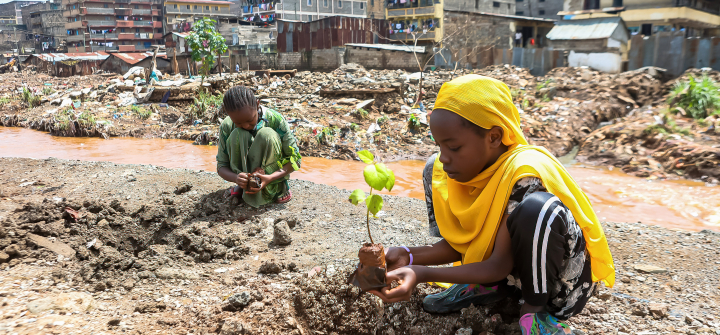Youth and the UN High-Level Meeting on NCDs and Mental Health: From Commitments to Action
This week, for the first time, mental health will be at the heart of a UN meeting involving all member states at the heads of state level. At the UN High-Level Meeting on the Prevention of Noncommunicable Diseases and Mental Health, scheduled for September 25 in New York City, governments will make major political and financial commitments to mental health. This didn’t just happen.
Civil society, advocates, researchers, funders, bilateral agencies and others have led campaigns, events, and discussions at various levels and convenings—from the World Health Assembly to conferences such as Women Deliver—and engaged directly with governments to make mental health—and particularly youth mental health—a focus for discussion.
Adolescence is a crucial time for developing the skills and resilience needed for a healthy life. When young people feel economically secure and grow up in safe and supportive environments, they thrive, and, in turn, contribute to their communities. Yet one in seven 10–19-year-olds face mental health challenges, and suicide remains one of the leading causes of death among young people. Most mental health conditions start before age 24, but investment in prevention and promotion is minimal, especially in low- and middle-income countries.
This week, we have the opportunity to advance the message that mental health, and specifically young people’s mental health, must be both an economic and moral priority.
We are moving toward a critical moment, when all UN member states agree on the urgency of improving young people’s mental health and acknowledge its interconnected root causes and drivers. For us, this is significant, as we view mental health as a right and recognize that young people’s well-being is shaped by interconnected personal, environmental, and societal factors—from rising political and economic uncertainties to the harmful impacts of digital technologies and artificial intelligence. Progress takes more than individual interventions, and the more this is recognized across sectors, the more we can work together to achieve systemic change for and with young people.
To ensure that the High-Level Meeting results in meaningful policy and investment outcomes for young people’s mental health, we have worked with young people who are living with ill mental health, hundreds of civil society organizations from across the world, UN agencies, academia, health professionals, companies, and governments.
Following the Multistakeholder Hearing on NCDs and Mental Health, held in May 2025 in the lead-up to this week’s High-Level Meeting, the secretariat of the Global Mental Health Action Network confirmed that mental health was in the spotlight at the highest level of global health conversation, noting in a statement that those shaping the political declaration (the statement that will be adopted by UN member states outlining new commitments for preventing and controlling NCDs and promoting mental well-being) “were being directly confronted with the dire, and too often overlooked, state of mental health around the world, and at the same time, were being presented with clear, actionable solutions for transformative and sustainable change.”
As we write, negotiations are set to conclude on September 25, but they are certainly not finished. As things stand, the political declaration calls on all UN member states to:
- Scale up services, support and treatment for mental health conditions.
- Improve suicide prevention measures.
- Address the social, economic, and environmental determinants of mental health, including the harms caused by digital technologies.
- Regulate harmful digital environments in a way that protects young people’s rights.
- Promote universal access to quality education and supportive living and learning environments.
- Address mental health-related stigma.
To improve young people’s lives around the world, these words need to be translated into action. One example is the Being Initiative, a global, multistakeholder effort led by Grand Challenges Canada, with partners including Science for Africa Foundation, Fondation Botnar, United for Global Mental Health, Orygen, and the UK’s Department for Health working together to drive investment, innovation, and better policies in mental health promotion and prevention. By bringing together various stakeholders from different countries, Being enables access to research outputs and guarantees that evidence informs program and policy agendas on youth mental health at the national and global levels and supports the scale-up of innovations. In Tanzania, the evidence generated by the initiative has increasingly informed national planning on youth mental health. At the global level, Being has helped advance prevention and promotion agendas through platforms such as the WHO Mental Health Forum and the Global Mental Health in Asia symposium, while advocacy efforts by UGMH and partners helped advance the decriminalization of suicide in Pakistan, Ghana, Guyana, and Malaysia. Our work has made it clear that systemic change requires integrated, multistakeholder action.
We hope that we look back on this week’s High-Level Meeting as a milestone on the road to a world where young people, wherever they are, feel well and thrive. The momentum for youth mental health is building. To ignite more collective, coordinated action, governments, funders, and implementers need to act now.
Nicole Bardikoff, PhD, is the mental health lead at Grand Challenges Canada, where she directs the global mental health strategy and portfolios, including the Being Initiative.
Aline Cossy-Gantner, PhD, the portfolio manager for mental health at Fondation Botnar, leads health research and implementation programs, including the Being initiative.
Sarah Kline, MA, is the CEO and co-founder of United for Global Mental Health and holds extensive leadership experience in global health advocacy, policy, and financing, including senior roles at the WHO.
Join the 50,000+ subscribers in 170+ countries who rely on Global Health NOW summaries and exclusive articles for the latest public health news. Sign up for our free weekday newsletter, and please share the link with friends and colleagues: https://globalhealthnow.org/subscribe .
Teenage girls, residents of Kiamako slum, take part in planting a tree near a site of homes destroyed by floods along the bank of Mathare River. Nairobi, Kenya, June 5, 2024. Boniface Muthoni/SOPA Images/LightRocket via Getty







